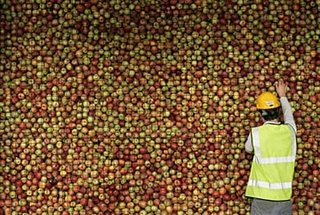Finally, some good news!
Spring frosts and an endless summer washout have left many of Britain’s traditional crops in complete disarray. Bread and potatoes have already risen steeply in price and meat prices will go the same way when the poor grain harvest kicks in.
But there is one little beam of sunlight: traditional cider makers, at least in central Somerset, are reporting bumper crops of apples this year.
“When they were planted traditional orchards were designed to deal with late frosts and plenty of rain is a positive for growing apples,” said Neil Champken of the Somerset Cider Vinegar Company.
“A hundred years ago, growers planned for apples to crop over a period of several months to give themselves time to squash them all. For this reason they chose a fair proportion of late varieties like Black Dabinett, Chisel Jersey, Brown Snout or even Michelin.”
“You have to remember, that with climate-change spring has been arriving earlier and earlier. In many ways traditional cider orchards are purpose built to cope with late April and early May frosts,” he said.
Industrial scale cider producers grow large quantities of just a few apple varieties so that they can all be harvested at the same time and that the concentrated juice (that is made from them) tastes the same throughout the year.
John Harris of Westcroft Cider said: “I have read horror stories in the media about this year’s harvest but we’ve got a bumper crop of fruit. I grow trees on a south side of Brent Knoll (a local hill) which is steep but sheltered. I should think that is why that site was selected in the first place. Many of my trees have been there since before the First War.”
Traditionally, Somerset’s cider orchards were planted on small plots of land that didn’t fit into the farm’s crop rotation for one reason or another. It was normal practice to protect them from the prevailing weather with plantings of native trees.
“Large orchards can’t be protected by wind breaks and they need to be on flat land to allow access to machinery. Also, the trees are planted much further apart to allow picking machines to get in between them. Traditionally trees - cultivated on standard root stocks - were planted much closer together so that they protect each other from frosts,” said Neil Champken.
“Although we have plenty of fruit, much of it is quite small but we still have a couple of weeks before we are picking flat out. All-in-all, we can say that 2013 will be a great year for making cider and cider vinegar in central Somerset,” said John Harris.
